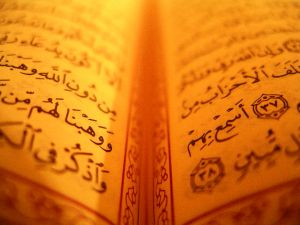In the name of God
Merciful to all,
Compassionate to each!
Praise be to God, Lord of the Worlds:
Merciful to all
Compassionate to each!
Lord of the Day of Judgement.
It is You we worship, and upon you we call for help.
Guide us to the straight path,
The path of those upon whom your grace abounds,
Not those upon whom anger falls,
Nor those who are lost.
—
I begin mystudy of the Qur’an at the most obvious point – the opening. I believe this is the prayer devout Muslims pray 5 times each day, and so I take it that it in a sense sums up the Muslim’s resposne to God – that is, it sums up the heart of what it means to be Muslim?
It’s a beautiful sounding prayer which roots life in what’s known about God – He is Lord of the worlds, merciful and compassionate, Lord over the Judgement Day. The fundamental responses of the devout are praise and dependence, working themselves out in obedience. The attitude this prayer conveys is one of humility before God. It seems Islam calls for a spiritual life of humble dependence on the sovereign Lordship of God.
The petition to God, what Muslims are depending on him for, is guidance. Guidance in the right way to live, the path to life, rather than the path of those who incur God’s anger by their lives. It seems the Qur’an claims that people can’t find their way down the straight path on their own…they’re dependent on God for that.
I think everything that’s said here could be prayed by a Christian to God as well. To do everything in the name of God, to respond to him with praise, humility and dependence for guidance on the straight path, to bow the knee to his Lordship over creation – all this the Bible calls on as the right way to live. The difference between this and Christian creeds and prayers that sum up the Christian life is in what’s not said. In the unfolding story of the Bible the focus of God’s Lordship over creation and the Day of Judgement, of his guidance, and the fous of the Christian’s praise and dependence is revealed to be Jesus Christ. Not as one alongside God, but as the manifesttion of God. And the primary thing we’re dependent on God for – before even God’s guidance can be any use to us – is our salvation from sin, from guilt, from the power of death, from our hearts which rebel against his desire for us, which we have no power to rescue ourselves from. Only then can we live by following his guidance.

